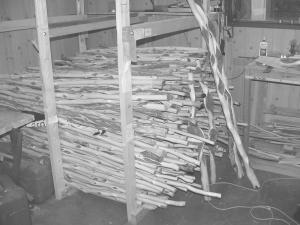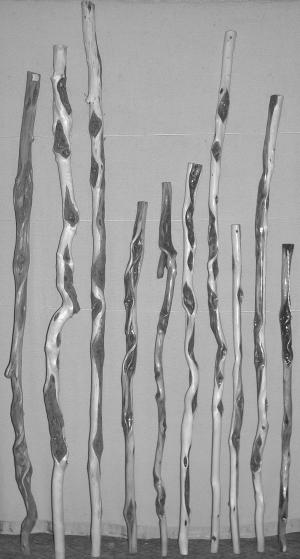2005 - Volume #29, Issue #5, Page #08
[ Sample Stories From This Issue | List of All Stories In This Issue | Print this story
| Read this issue]
Walking Stick Hobby Grew Into Business
 |
 |
Diamond willow is a popular woodworking material because each piece is unique and interesting, while at the same time, strong. The dark brown diamonds on the sticks contrast beautifully with the stark white willow wood.
John is a bison rancher and Ken is a retired accountant, but both spend much of their spare time in the bush, collecting specimens that they later make into sticks, canes, stair rails, lamps and coffee cup holders. Bigger ones work well for light posts, signposts and mailbox posts.
The Laningas sell most of their walking sticks to Americans, but have had many international orders in addition to supplying Peace River, Alta. area tourist shops.
They started their sideline business as a hobby in 1994 and get much enjoyment from walking through the swamps on their property, in search of extra-fancy diamond willow branches.
"I only cut live ones between May 15 and July 15 because during that period, the sap is running and they are very easy to peel. Other times of the year, I mark the green ones with ribbons, to collect later," Ken explains.
The Laningas say they find the best diamond willow trees near beaver dams and other wet areas. It has taken them years of experience to judge tree limbs for their potential as walking sticks, given that they are usually disguised with bark, lichen or vines.
After skinning bark from the sticks, they dip the ends in melted wax to help prevent cracking. Next, they dry the green, peeled sticks for about a year by laying them on a rack at the back of their shop.
Then they sand the bark out of the diamond indentations using a "Flex Drum Sander" (a brand they highly recommend), before finely sanding the rest of the stick. They also drill a hole at the top for a cord handle. They coat the sticks with up to three layers of Varathane, and price them based on their size and the number of diamond shapes they have.
Finished, low-end sticks sell for $20 (Can.), and have 8 to 10 diamonds. Some of the larger, fancier sticks sell for more than $85 each. The quality and number of diamonds and twists is what determines the stick price, rather than size.
About 90 percent of the sticks the brothers sell are unfinished ones, for people who want to do the work themselves, which often includes carving.
Contact: FARM SHOW Followup, Ken Laninga, 9705 - 88 Ave., Grande Prairie, Alta., Canada T8V 0B6 (ph 780 532-3077; stixsite@telus.net; www.sticksite.com) or John Laninga (bison3@telus.net). NOTE: COMPANY IS NO LONGER IN BUISNESS

Click here to download page story appeared in.

Click here to read entire issue
To read the rest of this story, download this issue below or click here to register with your account number.




